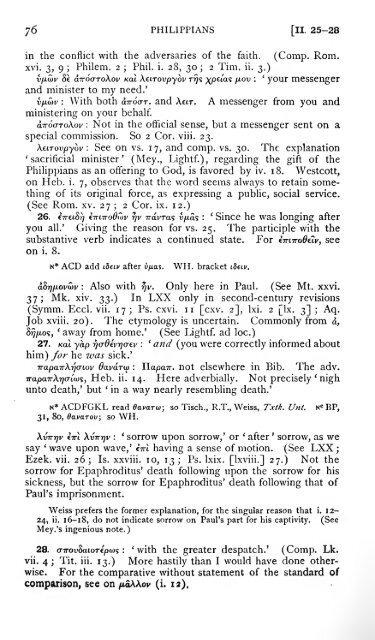Philippians and Philemon - MR Vincent - 1906.pdf
Philippians and Philemon - MR Vincent - 1906.pdf
Philippians and Philemon - MR Vincent - 1906.pdf
You also want an ePaper? Increase the reach of your titles
YUMPU automatically turns print PDFs into web optimized ePapers that Google loves.
6 PHILIPPIANS [. 25-28<br />
in the conflict with the adversaries of the faith. (Comp. Rom.<br />
xvi. 3, 9 ; Philem. 2 ; Phil. i. 28, 30; 2 Tim. ii. 3.)<br />
<strong>and</strong> minister to my need.'<br />
:<br />
' your messenger<br />
: With both.<strong>and</strong> Aetr. A messenger from you <strong>and</strong><br />
ministering on your behalf.<br />
: Not in the official sense, but a messenger sent on a<br />
special commission. So 2 Cor. viii. 23.<br />
XetTovpyov : See on vs. 1 7, <strong>and</strong> comp. vs. 30. The explanation<br />
'sacrificial minister' (Mey., Lightf.), regarding the gift of the<br />
<strong>Philippians</strong> as an offering to God, is favored by iv. 18. Westcott,<br />
on Heb. i. 7, observes that the word seems always to retain something<br />
of its original force, as expressing a public, social service.<br />
(See Rom. xv. 27 ; 2 Cor. ix. 12.)<br />
:<br />
8€ 26. ' Since he was longing after<br />
you all.' Giving the reason for vs. 25. The participle with the<br />
substantive verb indicates a continued state. For,see<br />
on i. 8.<br />
N* ACD add after u^ias. WH. bracket tbeiv.<br />
: Also with . Only here in Paul. (See Mt. xxvi.<br />
37; Mk. xiv. 33.) In LXX only in second-century revisions<br />
(Symm. Eccl. vii. 17; Ps. cxvi. 11 [cxv. 2], Ixi. 2 [Ix. 3] ; Aq.<br />
Job xviii. 20) . The etymology is uncertain. Commonly from a,<br />
,' away from home.' (See Lightf. ad loc.)<br />
27. :<br />
him) for he was sick.'<br />
' <strong>and</strong> (you were correctly informed about<br />
: .not elsewhere in Bib. The adv.<br />
,Heb. ii. 14. Here adverbially. Not precisely ' nigh<br />
unto death,' but ' in a way nearly resembling death.'<br />
N* ACDFGKL read;so Tisch., R.T., Weiss, TxiL• Unt. n^BP,<br />
31, 80, ..\>; so WH.<br />
-iirl '<br />
: sorrow upon sorrow,' or ' after ' sorrow, as we<br />
say 'wave upon wave,' ctti having a sense of motion. (See LXX;<br />
Ezek. vii. 26; Is. xxviii. 10, 13; Ps. Ixix. [Ixviii.] 27.) Not the<br />
sorrow for Epaphroditus' death following upon the sorrow for his<br />
sickness, but the sorrow for Epaphroditus' death following that of<br />
Paul's imprisonment.<br />
Weiss prefers the former explanation, for the singular reason that i. 12-<br />
24, ii. 16-18, do not indicate sorrow on Paul's part for his captivity. (See<br />
Mey.'s ingenious note.)<br />
28. )?:<br />
'with<br />
the greater despatch.' (Comp. Lk.<br />
vii. 4 ; Tit. iii. 13.) More hastily than I would have done otherwise.<br />
For the comparative without statement of the st<strong>and</strong>ard of<br />
comparison, see on (i. 13),





